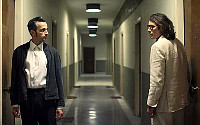| SHADOWS ON THE WALL | REVIEWS | NEWS | FESTIVAL | AWARDS | Q&A | ABOUT | TALKBACK | ||
 Shadows off the beaten path Shadows off the beaten path | ||
| Indies, foreigns, docs, revivals and shorts... | ||
|
On this page:
ALL GOOD HOLIDAY | SOFIA | THE WAITER < < F O R E I G N > > last update 13.Nov.18 See also: SHADOWS FILM FESTIVAL | ||
| R E V I E W B Y R I C H C L I N E | ||
All Good
 Alles Ist Gut Alles Ist Gut
| ||
|
dir-scr Eva Trobisch prd Josefine Gotze, Veronika Neuber with Aenne Schwarz, Andreas Dohler, Hans Low, Tilo Nest, Lina Wendel, Lisa Hagmeister, Katrin Rover, Alexander Tschernek, Dagny Dewath, Annika Blendl, Thomas Grassle, Christian Heiner Wolf  release Ger 27.Sep.18,
release Ger 27.Sep.18, US Oct.18 hiff, UK Nov.18 liff 18/Germany 1h33 
|  There's an earthy, realistic approach to the difficult situations in this German drama, and the dilemmas the characters face are both timely and involving. But writer-director Eva Trobisch overeggs the script with events that are predictable, over-complicated and ultimately contrived. And this pushiness undermines the film's important exploration of the complexity of the #MeToo era.
There's an earthy, realistic approach to the difficult situations in this German drama, and the dilemmas the characters face are both timely and involving. But writer-director Eva Trobisch overeggs the script with events that are predictable, over-complicated and ultimately contrived. And this pushiness undermines the film's important exploration of the complexity of the #MeToo era.
With their publishing business going under, Janne and Piet (Schwarz and Dohler) are further squeezed after buying a country house to redo. Then at a class reunion, Janne runs into Robert (Nest) and his brother-in-law Martin (Low), a nice guy who fails to take her "no" at face value. Embarrassed and annoyed with herself for not resisting him, Janne tells no one about this clumsy encounter, including her mother (Wendel). But when she takes a job with Robert, she finds herself mixing more closely with Martin. And this strains her relationship with Piet. It's refreshing to see a filmmaker refuse to simplify this kind of situation. Janne's rape is never in question, but the way forward is nuanced. Her inability to speak about this is understandable, as is Martin's abject apology. Further adding texture, Piet overreacts badly to almost everything, even without knowing what Janne has been through. This too is layered with meaning within their professional situations. And these issues would be enough to sustain the film without obvious twists. Schwarz is terrific, creating a vivid depiction of a young woman grappling on her own with something far too big to keep bottled up inside. Naturally, this expresses itself through everything she says and does, and Schwarz cleverly underplays this. Her chemistry with Dohler is strong, even if Piet is so bullheaded that it's tricky to see why they're together. The way he explodes then runs away from every conversation is more than a little irritating. Janne clearly sees something we can't. As the story continues, there are a couple of major plot points that come along exactly as expected, pushing things in tiresome directions. The way things play out is original and telling, but perhaps Trobisch could have made her point more forcefully by taking a more original, subtle approach. There's also an unnecessary subplot involving Robert's strained relationship to his much-younger second wife (Hagmeister) that both rings false and feels like some sort of personal jab. Even so, this is a rare film that dares to tackle a big topic without offering knee-jerk morality or easy answers. | |
|
15 themes, language, sexuality 6.Nov.11 tiff
| | |
| R E V I E W B Y R I C H C L I N E | ||
Holiday

| ||
|
dir Isabella Eklof prd David B Sorensen scr Johanne Algren, Isabella Eklof with Victoria Carmen Sonne, Lai Yde, Thijs Romer, Yuval Segal, Adam Ild Rohweder, Bo Bronnum, Morten Hemmingsen, Michiel de Jong, Mill Jober, Stanislav Sevcik, Laura Kjaer, Saxe Rankenberg Frey  release US Jan.18 sff,
release US Jan.18 sff, Den 11.Oct.18, UK Oct.18 lff 18/Denmark 1h33 LONDON FILM FEST 
|  A sunny vacation spot is the setting for this rather perplexing Danish melodrama. Populated with undefined characters who are reprehensible, it's a difficult film to engage with due to its sketchy and unconvincing plot. There are some chilling observations on tough-guy masculinity, but the film's message never makes it through the murky narrative. And a startlingly graphic sex scene seems here just to give the film notoriety.
A sunny vacation spot is the setting for this rather perplexing Danish melodrama. Populated with undefined characters who are reprehensible, it's a difficult film to engage with due to its sketchy and unconvincing plot. There are some chilling observations on tough-guy masculinity, but the film's message never makes it through the murky narrative. And a startlingly graphic sex scene seems here just to give the film notoriety.
A rather dim young woman, Sascha (Sonne) arrives in Bodrum for a holiday with an extended family of Danish criminals headed by Michael (Yde), who welcomes her to his bed as a trophy girlfriend. When younger doofus Musse (Rohweder) messes up a business transaction, he's suitably punished, but this only briefly disrupts the drunken, drug-fuelled revelry on the gorgeous Turkish seaside. Meanwhile, Sascha has befriended Thomas (Romer), a nicely flirtatious Dutch guy living on a boat. Michael doesn't take this well at all, inviting Thomas for dinner and some personalised menacing. These Danes don't exactly give their country a good name. Boorish and entitled, they insult everyone, including each other. Michael is the cock of the walk, while his younger acolytes echo his macho attitudes with homophobia and misogyny. The two sexual scenes between Michael and Sascha are deeply troubling, revealing both his contempt for women and her self-loathing. So it's nice to see her connect with the one genuinely decent person around, even if her idea of being nice is to give Thomas drugs. With deliberately under-defined characters, actors can't really connect with the audience. Sonne's perpetual fake grin is superb, playing Sascha as a damaged soul with little hope, so she may as well live the high life now, whatever the cost. Yes, it's that grim. And the men around her are brutes. The most interesting is Michael, and Yde is charismatic but never terribly nuanced. Thomas is much more engaging, and he gets to add more grit in the later scenes. Director Eklof shoots in an appropriately trashy, sun-drenched style that unsubtly plays up this mob's lack of taste (and humanity). Even scenes with an element of pathos are lacking in understatement or texture. This is a bombastic film that boldly depicts the way women are commodified in male-dominated circles. There are quite a few horrific moments along the way, but they're shot to give power to attackers rather than sympathy for victims. Which muddles any message about this all-grabbing culture. | |
|
18 themes, language, sexuality, violence 6.Nov.11 tiff | ||
| R E V I E W B Y R I C H C L I N E | ||
Sofia
 MUST
MUST  SEE SEE
| ||
|
dir-scr Meryem Benm'Barek prd Olivier Delbosc with Maha Alemi, Lubna Azabal, Sarah Perles, Faouzi Bensaidi, Hamza Khafif, Nadia Niazi, Rawia, Mohamed Bousbaa, Mansour Badri, El Hocine Aba, Ghita Fokri, Khadija Adly  release Fr 5.Sep.18, US Oct.18 ciff 18/France 1h20 
|  Edgy and uncompromising, this strikingly inventive film jaggedly cuts through the pretence in a repressive society. The setting is Morocco, and the central theme is the unbending law against extra-marital sex, which carries a prison sentence. Even with realistically abrasive characters, writer-director Meryem Benm'Barek sympathetically pulls the viewer into a minefield situation that each person is trying to manipulate.
Edgy and uncompromising, this strikingly inventive film jaggedly cuts through the pretence in a repressive society. The setting is Morocco, and the central theme is the unbending law against extra-marital sex, which carries a prison sentence. Even with realistically abrasive characters, writer-director Meryem Benm'Barek sympathetically pulls the viewer into a minefield situation that each person is trying to manipulate.
When Sofia (Alemi) goes into labour, she still denies that she can be pregnant. Cousin Lena (Perles) springs to her rescue, secreting her to hospital. But without a husband, she's in trouble. And the father Omar (Khafif) is nowhere to be found. Sofia's parents (Niazi and Bensaidi) are stunned by the arrival of a granddaughter, and Lena's savvy mother (Azabal) gets to work fixing things, from arranging a hasty but elaborate wedding to shoring up an important business deal with family friend Ahmed (Bousbaa), which would be threatened by any scandal. As the story develops, only Lena acts selflessly, going far out of her way to help the ungrateful Sofia and smooth many ruffled feathers. Omar reacts horribly, as expected, although his family at least tries to be conciliatory. But there are secrets lurking in the tale that redefine who is the true victim here, if there is one. And through it all, it becomes clear that it's the women who have to take extreme actions in a society that's legally and physically tilted against them. Their strength is the real story here. Each of the performances is unapologetic and raw, never sweetening anything for the viewer. Alemi plays Sofia as a staggeringly complex young women. She's often an annoying lump, but she has a cheeky smile and knows much more that she's letting on. It's her hidden steeliness that makes the film unforgettable. But then, each of the women have the same layers of outward vulnerability and inner toughness. And even Khafif's Omar has an integrity underneath his crude, rude behaviour. Benm'Barek develops this story intimately, pulling the audience in so closely that each twist in the tale comes as a genuine shock. This reveals Lena as the story's true protagonist, the one pure-hearted person who doesn't let archaic laws or repressive traditions dictate her compassionate response. So the film is a cry for honesty in a culture that only pretends to protect people with laws that put the innocent behind bars. And the worry is that, after this experience, Lena may have learned to hide her kindness like everything else. Which isn't good for anyone. | |
|
12 themes, language 4.Nov.18 tiff
| | |
| R E V I E W B Y R I C H C L I N E | ||
The Waiter

| ||
|
dir-scr Steve Krikris prd Nikolas Alavanos, Steve Krikris with Aris Servetalis, Yannis Stankoglou, Alexandros Mavropoulos, Chiara Gensini, Antonis Myriagos, Yorgos Glastras, Maria Kallimani  release Gr Nov.18 tiff
release Gr Nov.18 tiff18/Greece 1h44  
|  Greek filmmaker Steve Krikris brings plenty of moody visual style to this dark drama, so it holds the interest as it slowly creeps through a plot that swirls with suggestion. But as the film continues, it becomes increasingly clear that there's very little to it. Basically a character study, it's very nicely observed but too contrived and humourless to work on any more than a superficial level.
Greek filmmaker Steve Krikris brings plenty of moody visual style to this dark drama, so it holds the interest as it slowly creeps through a plot that swirls with suggestion. But as the film continues, it becomes increasingly clear that there's very little to it. Basically a character study, it's very nicely observed but too contrived and humourless to work on any more than a superficial level.
A 40ish waiter in a classy Athens patisserie, Renos (Servetalis) enjoys his job as well as his hobbies painting and tending to his houseplants. He exchanges banter with his lovelorn, gambling-addict colleague Thunder (Mavropoulos) and hallway pleasantries with his neighbour Milan (Myriagos). Then a stranger (Stankoglou) appears at the flat, saying Milan is away on business and inviting Renos to dinner. But Renos has spotted suspiciously Milan-looking body parts in the local dumpster. And the stranger's girlfriend Gina (Gensini) looks perpetually terrified. Krikris shows all of this in a mix of crisp light and deep-coloured murk, while everyone walks and talks in slow motion, barely cracking even a hint of a smile. Except this bizarre stranger, of course, who is relentlessly jolly about his freaky French culinary creations, visits to the local hammam and drags Renos on days out in the countryside, where things take the expected twist. What never makes sense is Renos' reluctance to call the police at the first sight of trouble. Surely that wouldn't rattle his carefully ordered life any more than what he does instead. Servetalis is engaging in virtually every frame of the film, with his observant eyes and pinched physicality. Renos constantly offers facts when no one asks, right to the film's final moment, but even when he's silent there's a likeable air of awkwardness about him. By contrast, Stankoglou is clearly shady from the moment we first see him with a heavy bin bag. Mavropoulos is haplessly self-involved. And Gensini is almost always distraught. These aren't the most layered characters, but the cast dive in fully. Where the story goes is loaded with intrigue, and Krikris answers most of our questions in a swirl of inexplicable flashbacks (who is remembering this?) as the story heads into a final act that should feel a lot more harrowing. But through Renos' eyes everything is matter-of-fact, so the closing scenes have an almost eerie inevitability to them that steals the power from the drama, leaving the film as an interesting oddity that's strangely lacking an emotional kick. | |
|
15 themes, language, violence 5.Nov.18 tiff | ||


See also: SHADOWS FILM FESTIVAL © 2018 by Rich Cline, Shadows
on the Wall
| ||
